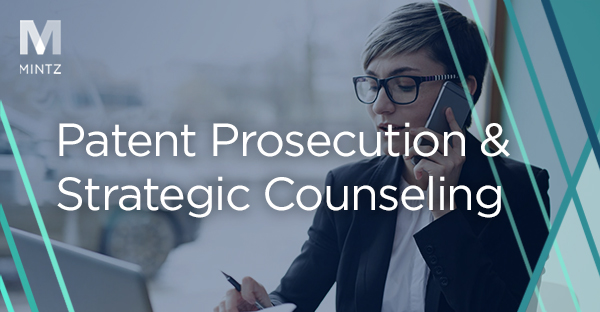
Intellectual Property
Viewpoints
Filter by:
Patent Owner Tip #18 for Surviving an Instituted IPR: Defending Depositions
September 23, 2021 | Blog | By Michael Newman, Sean Casey
In our penultimate patent owner tip for surviving an instituted IPR, we turn our discussion to defending the deposition of your expert. At this stage of the proceeding, your Patent Owner Response has been filed, and all the facts and arguments you need have already been developed, including any necessary expert testimony.
Read more
When It Isn’t Better Late Than Never: ALJ Reins in on Redesigns First Disclosed in the Last Week of Fact Discovery
September 21, 2021 | Blog | By Michael Renaud, Adam Rizk, Matthew Karambelas, Tianyi Tan
In a recent IAM article, Levelling the playing field in ITC patent cases by identifying redesigns to a set deadline, we commented on best practices for ITC complainants to protect their interests against the nascent uptick of redesign submissions at the tail end of fact discovery. Although reasonable minds can differ as to whether the uptick in motion practice is coincidence or a more troubling sign that some respondents are using late redesign disclosures as a vehicle to put complainants at a disadvantage in fast-paced Section 337 proceedings, such late disclosures undoubtedly prejudice complainants’ ability to fully review and assess such disclosures for possible infringement.
Read more
N.D. Ill. Finds that a Foreign Parent Corp. May be Sued Under BPCIA Without the U.S. Subsidiary that Signed and Filed aBLA
September 21, 2021 | Blog | By Thomas Wintner, Adam Samansky, Joe Rutkowski
In what appears to be a case of first impression, on August 23, 2021 U.S. District Judge John Z. Lee of the United States District Court for the Northern District of Illinois denied a biosimilar applicant’s motion to dismiss a patent infringement suit brought under the Biosimilar Price Competition and Innovation Act (“BPCIA”) against a foreign parent corporation that did not file or sign the relevant abbreviated Biologics License Application (“aBLA”).
Read more
Genus Claims: Foiled again by Written Description
September 16, 2021 | Blog | By Thomas Wintner
In late August of 2021, the Federal Circuit reversed a jury verdict of $1.2 billion in favor of Juno Therapeutics and Sloan Kettering Institute because the jury’s finding that four of the asserted patent claims did not lack adequate written description under 35 U.S.C. § 112 was not supported by substantial evidence.
Read more
Federal Circuit Reiterates Requirement under § 287 that Alleged Infringers have Notice of Specific Alleged Infringement
September 9, 2021 | Blog | By Peter Cuomo, Adam Samansky, Nicholas Armington
US Open for FRAND Business: The Fifth Circuit Vindicates Ericsson, Finding that Ericsson’s Offers were FRAND
September 3, 2021 | Blog | By Michael Renaud, Daniel Weinger, Meena Seralathan
The United States FRAND jurisprudence had a recent watershed moment in a decision that is sure to reverberate through the standard essential patent (SEP) world, and specifically SEP litigation in the United States. Earlier this week, a Fifth Circuit panel affirmed a jury verdict that found licensing offers made by Ericsson to HTC for Ericsson’s 4G SEPs complied with Ericsson’s FRAND obligations, the first jury verdict of its kind in the United States.
Read more
Patent Owner Tip #17 for Surviving an Instituted IPR: Alternatives to Motions to Amend in IPR Proceedings
September 2, 2021 | Blog | By Peter Cuomo, Monique Winters Macek
After an inter partes review (“IPR”) is instituted, a patent owner may move to amend challenged claims to overcome the prior art. Here we provide some further information for patent owners considering ways to amend claims that are challenged in IPR by filing a reissue application or requesting reexamination.
Read more
Nonobviousness of Commercially Successful Designs: Mmm, Mmm, Not So Fast
August 31, 2021 | Blog | By Adam Samansky, Peter Cuomo, Serge Subach
Patent Owner Tip #16 for Surviving an Instituted IPR: Improve Your Chances of Getting Amendments
August 26, 2021 | Blog | By William Meunier, Courtney Herndon
Here are four tips for improving your chances of convincing PTAB to grant a motion to amend your claims.
Read more
PTAB statistics show interesting trends for Orange Book and biologic patents in AIA proceedings
August 24, 2021 | Blog | By Peter Cuomo, Joe Rutkowski, Nana Liu
The PTAB recently published the first update to its 2019 study of AIA trials involving petitions challenging Orange Book-listed patents and biologic patents through June 2021. Highlights of these pharmaceutical patent challenge statistics include, e.g., the number of these petitions filed, the number of instituted trials, and the trial outcomes since fiscal year 2013.
Read more
Patent Owner Tip #15 for Surviving an Instituted IPR: Procedure for Motions to Amend
August 19, 2021 | Blog | By Daniel Weinger, Nana Liu
See the guidelines on the procedural aspects of filing a motion to amend claims.
Read more
Patent Owner Tip #14 for Surviving an Instituted IPR: When Not to Amend Claims in an IPR
August 12, 2021 | Blog | By Brad M Scheller, Sean Casey
We look to those circumstances when a patent owner should think twice about amending, including when significant past damages exist, the current claims possess strong infringement reads and claim scope, petitioners are highly-motivated to fight and patent owner is cost sensitive.
Read more
AI in Biotech and Synthetic Biology: What Can Be Protected? What Should Be Kept Secret?
August 11, 2021 | Blog | By Joshua Berk, Terri Shieh-Newton
Machine learning (ML), bioinformatics, artificial intelligence (AI), and other computational tools have become ubiquitous in the biotech and synthetic biology industries because such technology allows for rapid processing of a large amount of complex data to produce advancements in therapeutics and diagnostics. As the landscape becomes increasingly more competitive, it is important for companies, particularly in the aforementioned industries, to obtain patent protection for their AI-related technology.
Read more
Patent Owner Tip #13 for Surviving an Instituted IPR: When to Amend Claims in an IPR
August 6, 2021 | Blog | By Monique Winters Macek, Michael Newman
After an inter partes review (“IPR”) is instituted, a patent owner has an opportunity to file a motion to amend the claims and thereby propose a reasonable number of substitute claims. Here we provide some instances where a motion to amend may be a favorable option for a patent owner to consider.
Read more
Federal Circuit Reminds the PTAB that the APA Process Still Matters
August 3, 2021 | Blog | By Daniel Weinger, Laura Petrasky
The Federal Circuit recently found that the Patent Trial and Appeal Board (“Board”) violates a patent owner’s procedural rights under the Administrative Procedure Act (“APA”) when construing a disputed claim term by omitting an uncontested requirement in its construction.
Read more
Patent Owner Tip #12 for Surviving an Instituted IPR: Address Individual Claims – Dependent Claims Can Save the Day
July 29, 2021 | Blog | By Peter Cuomo, Nana Liu
In inter partes review (IPR) proceedings, the PTAB will often uphold the validity of dependent claims despite finding the independent claim invalid. Dependent claims recite additional limitations that must be separately accounted for in the prior art references in the Petitioner’s asserted grounds.
Read more
The USPTO’s Patent Classification and Search Systems Have Jumped on the AI Bandwagon
July 8, 2021 | Blog | By Christina Sperry, Amanda Metell
It is no question that Artificial Intelligence (“AI”) technologies have popped up in all aspects of society such as online shopping, music streaming, and social networking. The U.S. Patent and Trademark Office (“USPTO”) has even reported that patents which incorporate AI has increased from under 5% in 1980 to over 20% in 2018. Among those organizations that utilize AI is the USPTO itself.
Read more
PATENT 101: Key Considerations and Activities for Establishing a Patent Program (Part 1 of 3)
July 7, 2021 | Blog | By Michael Van Loy, Kevin Amendt, Nicholas Eadie
Tasked with starting an innovation protection and patent development program at your company but do not know where to begin? This three part series describes the key components to a patent development program for any company, small or large.
Read more
Supreme Court Hammers Final Nail in the IP Bridge v. TCL Coffin
July 2, 2021 | Blog | By Michael Renaud, Daniel Weinger
On Monday, the Supreme Court denied TCL Communication’s certiorari petition, without comment, appealing the Federal Circuit’s ruling that the essentiality of a patent claim is a question for the jury rather than judges to resolve during claim construction. The denial of cert by the Supreme Court cements the Federal Circuit ruling which made proving infringement of standard essential patents easier by allowing reliance on the standard to show such infringement.
Read more
Patent Owner Tip #11 for Surviving an Instituted IPR: Use It or Lose It (in the POR)
July 1, 2021 | Blog | By William Meunier
When faced with an instituted IPR, the Patent Owner should include all arguments it wishes to preserve for appeal in its Patent Owner Response (“POR”), including arguments that the Patent Owner believes are unlikely to succeed before the Board but may be attractive to the Federal Circuit. Otherwise, the argument will be deemed waived and unavailable in any subsequent appeal.
Read more
Explore Other Viewpoints:
- Data Centers & Digital Infrastructure
- AI: The Washington Report
- Antitrust and Federal Regulation
- Appellate
- Arbitration, Mediation & Alternate Dispute Resolution
- Artificial Intelligence
- Awards
- Bankruptcy & Restructuring
- California Land Use
- Cannabis
- Class Action
- Complex Commercial Litigation
- Construction
- Consumer Product Safety
- Corporate Governance (ESG)
- Cross-Border Asset Recovery
- DEI Legal Developments
- Debt Financing
- Direct Investing (M&A)
- Diversity
- EB-5 Financing
- Education & Nonprofits
- Employment
- EnforceMintz
- Environmental (ESG)
- Environmental Enforcement Defense
- Environmental Law
- Environmental, Social, and Corporate Governance (ESG)
- FDA Regulatory
- FDA in Flux
- False Claims Act
- Federal Circuit Appeals
- Financial Institution Litigation
- Government Law
- Growth Equity
- Health Care
- Health Care Compliance, Fraud and Abuse, & Regulatory Counseling
- Health Care Enforcement & Investigations
- Health Care Transactions
- Health Information Privacy & Security
- IP Due Diligence
- IPRs & Other Post Grant Proceedings
- Immigration
- Impacts of a New US Administration
- Insolvency & Creditor Rights Litigation
- Institutional Investor Class Action Recovery
- Insurance & Financial Services
- Insurance Consulting & Risk Management
- Insurance and Reinsurance Problem-Solving & Dispute Resolution
- Intellectual Property
- Investment Funds
- Israel
- Licensing & Technology Transactions
- Life Sciences
- Litigation & Investigations
- M&A Litigation
- ML Strategies
- Managed Care
- Medicare, Medicaid and Commercial Coverage & Reimbursement
- Mergers & Acquisitions
- Patent Litigation
- Patent Prosecution & Strategic Counseling
- Pharmacy Benefits and PBM Contracting
- Portfolio Companies
- Privacy & Cybersecurity
- Private Client
- Private Equity
- Pro Bono
- Probate & Fiduciary Litigation
- Products Liability & Complex Tort
- Projects & Infrastructure
- Public Finance
- Real Estate Litigation
- Real Estate Transactions
- Real Estate, Construction & Infrastructure
- Retail & Consumer Products
- Securities & Capital Markets
- Securities Litigation
- Social (ESG)
- Special Purpose Acquisition Company (SPACs)
- Sports & Entertainment
- State Attorneys General
- Strategic IP Monetization & Licensing
- Sustainable Energy & Infrastructure
- Tax
- Technology
- Technology, Communications & Media
- Technology, Communications & Media Litigation
- Trade Secrets
- Trademark & Copyright
- Trademark Litigation
- Unified Patent Court (UPC)
- Value-Based Care
- Venture Capital & Emerging Companies
- White Collar Defense & Government Investigations
- Women's Health and Technology









